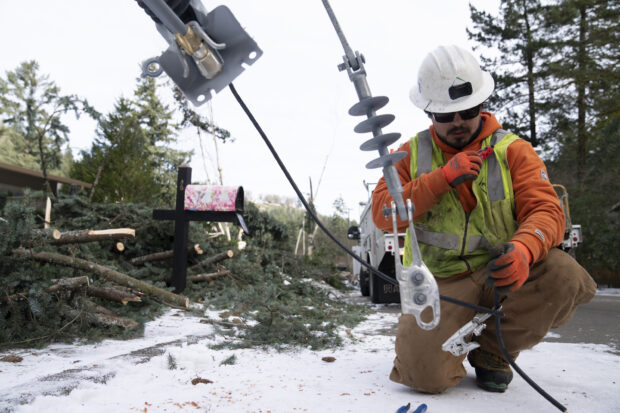
A worker from PGE works to install a new power line as crews work on restoring power to the area after a storm on Tuesday, January 16, 2024, in Lake Oswego, Ore. (AP Photo/Jenny Kane)
PORTLAND, Oregon — A power line fell on a car in Portland, Oregon, on Wednesday, killing three people and injuring a baby during an ice storm that turned roads and mountain highways treacherous in the Pacific Northwest.
Rick Graves, spokesman for the city’s fire department, said the power line crashed into the car after being drawn down by the branch of a large tree. It is believed the car’s passengers died when they exited the vehicle and became charged with electricity, he said.
Around Portland, long icicles dangled from roofs and cars, and ice-encased branches, plants, and leaves like thick glass. Swaths of the area were under warnings Wednesday for as much as an inch of ice, promising only to add to the damage wrought by a powerful storm that hit over the weekend and was blamed for at least seven deaths.
The warning area was reduced later in the morning to parts of southwest Washington and northwest Oregon, including Portland, a metro area of over 2 million, and further limited to the western edge of the Columbia River Gorge in the afternoon.
Diane Flaherty, resident of a hilly and forested neighborhood in southwest Portland, said her home has been without power since Saturday. That day, she left her house when she saw the large tree in her front yard start swaying in the strong wind. To stay safe – and warm – she decided to stay with her brother-in-law.
“It was like a war zone,” she said, describing the sound of trees cracking as they toppled onto her neighbors’ cars and homes. “We were absolutely stunned.”
READ: US in deep freeze while much of world extra toasty? It’s climate change
Schools and government buildings closed as authorities warned of icy roads and the chance of new power outages, even as crews struggled to restore electricity to thousands blacked out for days.
The storm canceled or delayed flights, including in Vancouver, British Columbia, where heavy snow blanketed the city and snarled traffic, The Canadian Press reported. The city could get nearly 8 inches (20 centimeters) of snow by the evening.
The storm hit the northwest corner of the U.S. as much of the rest of the country coped with bitter weather that, in some places, put electricity supplies at risk. More than 90,000 homes and businesses – mostly in Oregon – lost power across the country, according to PowerOutage.us.
A fountain at Antioch Park in downtown Houston still runs as ice forms on Tuesday, January 16, 2024. (Elizabeth Conley/Houston Chronicle via AP)
Freezing temperatures spread as far south as North Florida on Wednesday morning, said Bob Oravec, a National Weather Service forecaster. It was 12 degrees (minus 11.1 Celsius) early Wednesday in Atlanta, where thousands of students returned to school after icy weather Tuesday.
It was 5 degrees in Chicago (minus 15 Celsius) and 6 degrees (minus 14.4 Celsius) in Detroit – significantly colder than Alaska’s capital of Juneau, where it was 18 degrees (minus 7.8 Celsius). Some Midwesterners managed to find a bright side.
“It’s probably the most beautiful time in Chicago ever,” Richard Wineberg said as he admired the snow-covered landscape.
READ: Arctic freeze continues to blast huge swaths of US with sub-zero temps
New York and Philadelphia ended a drought of sorts, with snow falling in both cities. Five people were struck and killed by a tractor-trailer on Interstate 81 in northeastern Pennsylvania after they left their vehicles following a separate crash on slick pavement. Investigators were still determining the exact cause.
In western New York, the weather was blamed for three deaths in three days. Two people were apparently stricken while clearing snow, and a third was struck by a vehicle while brushing snow from his car, Erie County officials said Wednesday.
Heavy lake-effect snow was forecast in Buffalo, with up to 4 inches (10 centimeters) an hour expected through the afternoon. City hall was closed, school districts declared snow days, and travel bans were issued for several suburbs. The blast came days after a storm that delayed an NFL playoff game for a day.